Whether you have assistance from a legal professional or you handle your documents on your own, as a business owner, it is crucial to make sure that your business stays legally compliant. Although it might seem like a daunting task to keep up with all of the important dates and documents, it is an essential part of being your own boss. Annual reports are just one of many documents that companies are required to file on a yearly basis. Businesses that fail to file yearly reports could face fines or legal consequences. Although the rules differ from state to state, there are general similarities. Should you miss your filing deadline, your business may be subject to:
- Late Penalties—usually considered a "warning shot," the states will add a penalty to your filing fee for when you do file. At this point, you should not wait any longer and file.
- Administrative Dissolution—if you continue to wait past the grace period, after charging your business the late fee, you could face a loss of good standing, and the state can administratively dissolve your business. Once your company has been officially dissolved, you won’t be able to continue operations in the state until you at least get your business reinstated.
- Loss of Liability Protections—if your business is an LLC or corporation, you and your partners could lose the very protection that motivated you to choose those business structures. You could find yourself personally exposed to lawsuits and creditors (Northwest, 2020).
Do we have your attention yet? Good. Now that we got the ugly part out of the way, here is the good news: filing an annual report is one of the easiest things on your list of worries as a small business owner. But before we get into how to file an annual report, let’s first go over the basics.

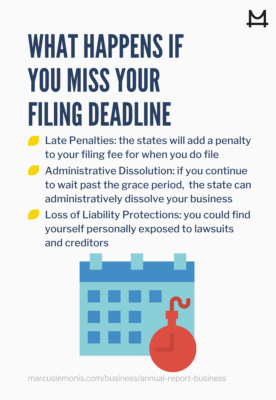
What is an Annual Report?
An annual report is a brief document that provides your state with updated information about your business. It is important to note that the information included in an annual report can vary slightly from state to state. Nonetheless, some of the most common information that is usually requested by most states includes:
- Business name and address
- Business identification number
- Names and addresses of the officers and directors
- Names and addresses of the members or managers
- Name and address of the registered agent
As you can see, it is basic information about your business that is most likely easily accessible. Some states charge franchise taxes for corporations or LLCs that operate with their border; these taxes might be required as part of the annual report filing fee (SBA, 2020). Also, should it apply to your business, the number of shares of stock issued by your company is information your state might want to know (Codemo, 2019;)
This being one of those numbers that Marcus would tell you that you should probably know off the top of your head. So, it’s just a matter of gathering the necessary evidence to back it all up so that you can submit a timely report as your state requires it.
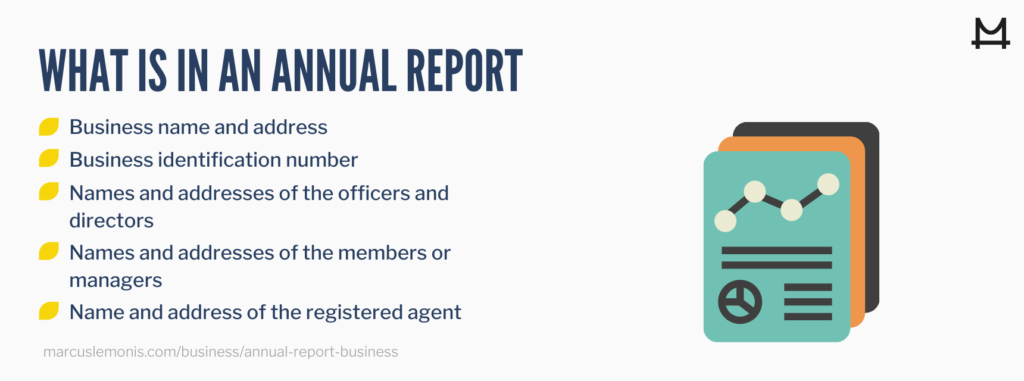
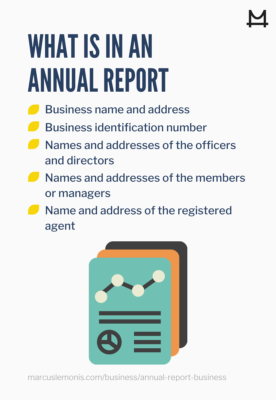
Do You Need to File It?
As mentioned before, how to file an annual report is not difficult. But requirements do vary from state to state, and some states might not even require it.

Also, if needed, it is up to the state to determine what types of business entities need to file a report. Some require reports for certain types of business entities but not for others. LLCs, corporations, non-profit organizations, limited partnerships, and limited liability partnerships may be necessary to file in your state. To find out whether your state requires an annual report for your business type, you should visit the state agency’s website where your organizational documents were filed.
When is it Due?
The when is very similar to the how to file an annual report. It will vary from state to state. While some states could set the due date on the anniversary of the business formation date, other states might choose a specific day for all businesses. This selected date could match your fiscal year tax filing deadline or be based on the full calendar year. Also, keep in mind that although it is called an “annual” report, some states may not require you to file a report every year. Some states have biennial filing (every other year), or even a decennial filing (every ten years). If looking for how to file an annual report for an LLC specifically, the due date will also be dependent on the state.
- Tip: Set up two reminder alerts on your calendar. One for the due date of your annual report and another for two weeks prior. That should give you enough time to complete and mail in your form or give you a final warning for the day it needs to be delivered in person. This is the best way to avoid missing the deadline, having to pay a hefty fee or jeopardize your good standing with your state.
How to Complete the Annual Report Form

Many states will allow you to fill out an electronic form and file your annual report through the state’s business filing agency website. In other states, you might have to print the form from the site and mail it in. In contrast, in other states, you might have to deliver it in person to get a receipt of the submission from the clerk of the business filing agency. But regardless of how your state requires the submission, it is essential to know that for almost every state, it is a set form that needs to be filed, and not an open format document that you must draft yourself.
Filing the Annual Report
Once you have obtained a copy of the form that you must fill out—whether you receive a physical paper copy by mail, from the state’s business filing agency, or you download a digital copy from their website—you must complete the form and submit it to the state along with any fee as required by your state. As mentioned before, if you own a franchise, your state may require you to pay franchise taxes or other business taxes along with your annual report (Haskins, 2019.) How to file an annual report will differ based on the state, so it is crucial that you verify with the Secretary of State where your business is registered for details.
- Tip: You can do an internet search for “annual report” + your state to try to get to the specific web page directly. But keep in mind that some states do not call this document an “annual report.” For example, in California, you file a “statement of information” instead. So, the name of the document you need to file might also vary from state to state.
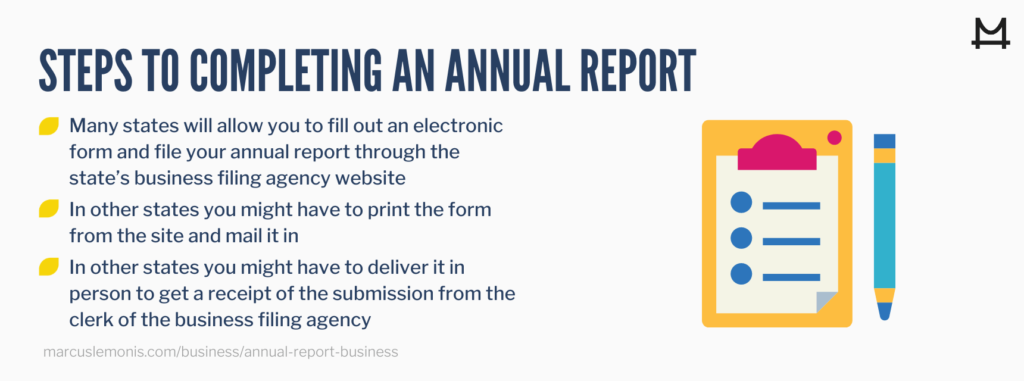
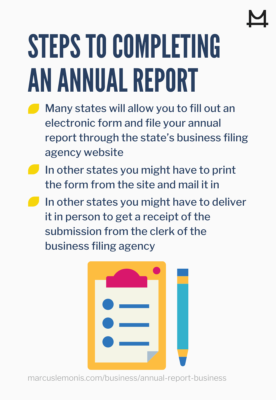
Does Your Business Operate in More Than One State?
How to file an annual report for an LLC or any other business entity will also vary if you are registered to do business in more than one state. Depending on the states where you do business, you may have to file annual reports in each state where you have your business registered. Once you have gathered all the information for the first one, you’ll have to repeat the same process you followed in filing in your home state.

Now that you know how to file an annual report or where to look for the necessary information to file your report, keep in mind that even if your information hasn’t changed from the previous year, you must file an annual report based on your state’s guidelines. The bottom line is that, while the practice of filing annual reports might just be a relic from when it was much more difficult for the states to keep business information up to date, it is nonetheless imperative to comply with your state’s regulations to avoid any potential penalties.
This article is informational only and subject to errors or omissions. As with any legal or regulatory advice, please consult your legal counsel or tax advisor to make sure you are in compliance with all and any federal, state, city or county rules and regulations. More
- Does your business need to file an annual report?
- What did you learn that you can now implement when you file your next annual report?
Codemo, R. (2019, June 27). Information to include in your business’s annual report.
Retrieved from https://www.legalzoom.com/articles/information-to-include-in-your-businesss-annual-report?li_source=LIHaskins, J. (2019, June 19). How to file an annual report.
Retrieved from https://www.legalzoom.com/articles/how-to-file-an-annual-reportMyAccountingCourse.com. (n.d.). What is an annual report?
Retrieved from https://www.myaccountingcourse.com/accounting-dictionary/annual-reportNorthwest, R. A. (Ed.). (2020). You forgot to file your annual report… now what?
Retrieved from https://www.northwestregisteredagent.com/forgot-to-file-annual-report.htmlSBA (Ed.). (2020). Stay legally compliant.
Retrieved from https://www.sba.gov/business-guide/manage-your-business/stay-legally-compliant





